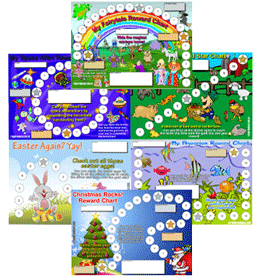Because the use of our reward charts within a positive reinforcement framework requires praising children constantly and frequently, it is important to consider the quality and appropriateness of the praise given.
Here are some tips for praising children which may be useful:
- Most importantly avoid the opposite of praise – criticism. Criticism, particularly hurtful criticism, is no help to your child and damages your relationship.
- Try to praise the behavior, not the child – children tend to think in definite terms rather than abstract, so a child might readily think of themselves as “good” or “bad” depending on whether they have behaved well or behaved poorly. This can contribute to lowering a child’s self-esteem
- Praise is very rewarding in itself and can be a valuable behavior shaping tool.
- When praising children try to make it specific – it shows that you are taking notice.
- Children need praise and it is very important to acknowledge a child’s efforts, but try not to overdo it. You don’t want your child seeking your approval and applause for every little thing they do.
- Praise genuinely – praising children can lose its power if you constantly shower acclaim on usual and expected behavior.
- If you overdo praise, or gush over every small thing, or make up fake kudos, your child will see through them and may start to question even genuine praise.
- Sometimes it may be more appropriate to simply use acknowledgment such as a wink, a smile, eye-contact, a nod etc – it is more of a dispassionate praise that can help shape how a child pleases themselves rather than perform for approval.
- If you are praising children genuinely and appropriately you will avoid “over praising”, remembering that you don’t want to raise praise “junkies”.
- Whenever you can, try to turn the praise back toward your child. For example rather than saying you’re proud of her (which is perfectly fine), you might say “I bet you’re proud of yourself”. This can help develop you child’s internal motivations.
- Be “present” for your child when praising children. Get down on their level and make eye-contact.
- Give praise immediately after good behavior.
- Take notice – there are many genuinely praiseworthy moments in our child’s life that we simply miss.
- Most importantly avoid the opposite of praise – criticism. The power of praising children can easily be undone by the power of criticism.

